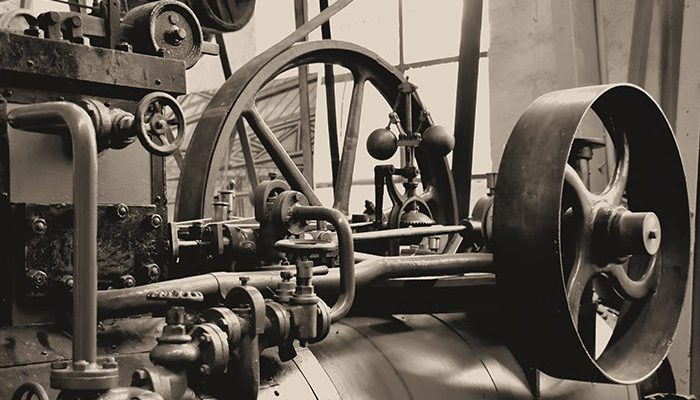Welcome to the New Age of Servitization
May 01, 2015 • Features • aston university • Future of FIeld Service • Servitization • tim baines
The world of manufacturing is getting ready for one of the most significant changes since the industrial revolution. Servitization is coming and amongst those leading the charge is Professor Tim Baines of Aston University. We're pleased to welcome him to the list of field service news columnists and here in this first article he gives us an introduction to this complex yet fascinating and important topic...
The world once seemed simple; manufacturers made things and services companies did things for us. Today, increasing numbers of manufacturers compete through a portfolio of integrated products and services.
This is a services-led competitive strategy, and the process through which it is achieved is commonly referred to as servitization. Celebrated exponents of such strategies include Rolls-Royce, Xerox and Alstom; all offer extended maintenance, repair and overhaul contracts where revenue generation is linked directly to asset availability, reliability and performance.
Servitization is much more than simply adding services to existing products within a few large multi-national companies. It’s about viewing the manufacturer as a service provider that sets out to improve the processes of its customers through a business model, rather than product-based, innovation. The manufacturer exploits its design and production competencies to deliver improvements in efficiency and effectiveness to the customer.
 Manufacturers have traditionally focused their efforts on product innovation and cost reduction. Companies such as Porsche and Ferrari are celebrated for bringing new and exciting designs into the market, while companies such as Toyota are held in awe for their work with Lean production systems. These successes foster a perception that the only way for manufacturing to underpin competitiveness is through new materials and technologies, faster and more reliable automation, machining with more precision, waste reduction programmes, smoother flow of parts etc.
Manufacturers have traditionally focused their efforts on product innovation and cost reduction. Companies such as Porsche and Ferrari are celebrated for bringing new and exciting designs into the market, while companies such as Toyota are held in awe for their work with Lean production systems. These successes foster a perception that the only way for manufacturing to underpin competitiveness is through new materials and technologies, faster and more reliable automation, machining with more precision, waste reduction programmes, smoother flow of parts etc.
Competition through services
Services offer a third way to compete. This is not an ‘instead of’ or ‘easy option’ for companies that are struggling to succeed. Indeed, delivering advanced services can require technologies and practices that are every bit as demanding as those in production. Neither do they require the manufacturer to abandon its technology strengths; instead it can build on these to help to ensure long term and sustained benefits. Consequently, there is a growing realisation that such services hold high value potential.
Conventional manufacturers can struggle to appreciate the value of services, seeking such simple explanations of servitization that they fail to appreciate potential benefits.
Servitization is a similar paradigm shift. The word ‘service’ can be used in different ways. It can refer to how well an action is performed – “that was good service” – or to an activity, like maintenance, spare parts provision and so on. Servitization relates to this second interpretation; activities that a manufacturer can perform to complement its products.
All manufacturers offer services to some extent, but some establish market differentiation through these, following services-led competitive strategies. Servitization is a term given to a transformation. It is about manufacturers increasingly offering services integrated with their products. Of these, some manufacturers choose to servitize by offering an extensive portfolio of relatively conventional services, while some move almost entirely into services, largely independent of their products, by providing offerings like general consulting. Others move to deliver advanced services.
Advanced services are core to servitization. Xerox’s ‘Managed Print Services’ is one example; rather than simply selling equipment, the company offers ‘document solutions’ to customers. For a typical customer, such as BA, Xerox provides project management, implementation of new technology, and management of third parties.
There are various types of advanced services, and a variety of terms is used across industry to describe these (e.g. availability contracting, performance contracting, managed services, solutions). However the outcome of these contracts is, invariably, a capability for a customer to perform a business function or process.
This is distinct from conventional services where the outcome is product ownership and maintenance of an asset’s condition. Particular contracting features are often coupled to advanced services.
There are four key features; the first three of which are relatively widespread: Pay-for-use revenue payment: pay-per click, pay-as-you-go, power-by-the-hour etc. are all terms used to refer to advanced services. For instance, in its contract with Xerox, Islington Borough Council receives a ‘click charge’ each time a document goes through a machine.
MAN Truck and Bus UK has 10,000 vehicles under contract, and expects this to grow by 50% over the next three to five years, to represent £200million of business.
When these features are coupled with the principle of delivering a capability, contracts become sophisticated and demanding. Many existing contracts are relatively large, which is perhaps part of their appeal to OEMs. MAN Truck and Bus UK has 10,000 vehicles under contract, and expects this to grow by 50% over the next three to five years, to represent £200million of business. The Heart of England NHS Foundation Trust’s five-year contract in its pathology laboratory is valued at £20M per year.
Advanced services are however not only for large organisations. They can hold high-value for manufacturers big and small. They can help strengthen relationships, lock-out competitors, and grow revenues and profits and this is why servitization can be a sustainable business model for manufacturers of all sizes.
Want to know more - why not attend the Servitization Spring Conference in May 18th - 19th Click here for more information





















 Field Service News is published by 1927 Media Ltd, an independent publisher whose sole focus is on the field service sector. As such our entire resources are focused on helping drive the field service sector forwards and aiming to best serve our industry through honest, incisive and innovative media coverage of the global field service sector.
Field Service News is published by 1927 Media Ltd, an independent publisher whose sole focus is on the field service sector. As such our entire resources are focused on helping drive the field service sector forwards and aiming to best serve our industry through honest, incisive and innovative media coverage of the global field service sector.
Leave a Reply